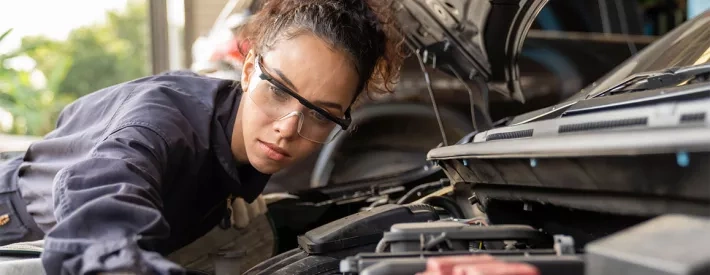Why now’s the time to invest in apprentices

The motor industry is driven by the talent in it. Any shortage of new blood could stifle its resilience, so now’s the time to supercharge apprenticeships
National Apprenticeship Week kicked off last week with the theme “build the future”. That message resonates with the motor industry, which needs to quickly build its talent pipeline ahead of a ban on the sale of new petrol and diesel vehicles from 2030, ushering in an electric future.
However, the latest figures from the Department for Education show that there were just 1,575 automotive apprentice starts in the first quarter of the 2020/21 academic year – a 63% drop compared with the same period last year.
“It’s hugely disappointing, albeit not very surprising, that automotive was one of the worst hit sectors for apprentice recruitment in 2020. This is a concern for a sector that faces one of its biggest challenges in a century as it prepares for the electric vehicle revolution,” says Steve Nash, the IMI’s Chief Executive.
It’s obvious then that there are incredibly important reasons why companies should be investing in apprenticeships now to ensure a brighter future tomorrow.
1. The skills gap
The first is the worrying drop in apprentice numbers in the past year as the pandemic disrupted these vital training schemes.
“There was a massive decline in apprentice starts in 2020, a downward trend which, if left unchecked, could result in a significant generational skills crisis across the automotive sector,” says Dean Lander, Head of Repair Sector Services at Thatcham Research.
There is already an ageing retail workforce, with figures from the IMI showing the average retail worker is 40, and only 18% of the workforce is between 16 and 24 years of age.
2. The digital revolution
The skills gap is growing with the digital revolution underway in British motoring. The government is phasing out petrol and diesel cars, accelerating the shift to electric vehicles. But just 1% of the current industry workforce is qualified to work on EVs.
Apprentices often have a natural affinity for technology, having grown up with it. Several apprenticeship frameworks cover technology, though the motor industry has called for a dedicated EV apprenticeship.
Still, as Lander says, “the bodyshop sector has an aging workforce and the gap between skills and existing knowledge is growing, an issue hastened by the emergence of new technologies”.
3. Apprentices pay dividends
Investing in apprenticeships also makes financial sense. The IMI’s Apprentice Return on Investment Calculator has proven that apprentices pay dividends, with an ROI of between 175% and 200% over the training period.
Apprentices typically will yield a profit within 12 to 24 months, according to the IMI.
“Investing in training an apprentice makes more economic sense than upskilling existing staff,” says Lander. “Upskilling is important, but it can result in lost productivity while an apprentice will increase productivity relatively quickly.”
4. Ready for recovery phase?
Apprentices will be vital to the sector’s economic recovery from COVID-19. Those companies with sufficient talent will be in a stronger position to capitalise on customer demand when the crisis eventually abates.
Electric and hybrid cars have already posted strong sales growth in January, so the wheels are turning faster on the shift to electrification.
“If we continue to invest in tomorrow’s workforce today, we’ll minimise disruption when normality returns – and ultimately increase the value of that investment in apprentices many times over,” Lander concludes.




